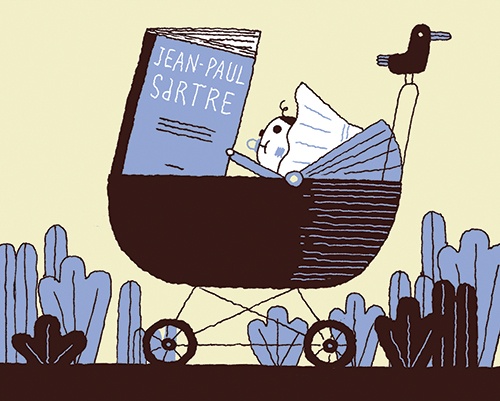 Illustration by Patrick Doyon
Illustration by Patrick Doyon
Les Enfants du Roi
Montreal's Plateau, or “La petite France,” is overrun with elegant, polite French children.
TO GET TO MY LIBRARY’S Baby Rhyme and Story Time, my daughter and I have to open the front door, walk to the corner of Mont-Royal Avenue and cross the street. Even when the ice on the sidewalk freezes into thick, wavy layers, the trip should take five minutes. Toddler tantrums, however, can make the journey last thirty, whether we’re in boots or sandals.
Witnessing an urban child freak-out is rare in the Plateau. Not because there aren’t kids. As my daughter weeps and stomps, the sidewalks spill over with kick scooters and balance bikes. Curly-headed cherubs lounge in strollers pushed by tattooed, bearded dads. No, it is a matter of demographics. Many here are from France; about one hundred thousand French expats live in Montreal, twenty thousand of whom call my neighbourhood home. “La petite France” is overrun with elegant, polite French children. They greet guests upon entering a room and recite thank-yous without prompting. These refined, cultured adults stuffed inside two-foot frames make cameo appearances in bakeries, exhibiting an uncanny amount of self- control—no holding mothers hostage at the register demanding viennoiserie. At parties, they eat raw cheeses with slimy rinds that could curl the tongues of even the most epicurean Canadian adults; at swimming classes on Papineau Avenue, they shiver, blue with cold but responding to instructions without dragging their flip-flops or, like my own daughter, letting out bloodcurdling screams.
THERE IS A DIFFERENCE between how French and Canadian parents raise their children: le cadre. In Bringing Up Bébé, American-born and Paris-based Pamela Druckerman explains the term, “frame” in English, as the boundaries and rules the children learn. I’ve performed many a late-night exegesis on Druckerman’s book about how French childrearing, like cuisine and art galleries, is superior.
But what I have witnessed in my corner of Montreal is immutable from Druckerman’s description of behaviour in Paris and Strasbourg.
To the untrained eye, French parents may appear disengaged. Spend a Wednesday evening at the Gilles-Lefebvre playground and you’ll see them arrive after work in polished black pumps and white linen slacks, reading Le Monde or chattering with friends while their offspring play on their own. Their kids have learned not to be un enfant roi; they entertain themselves. Meanwhile, my fingers hover over 9-1-1 as I nervously track my daughter through the jungle gym, wearing sweatpants stained with egg from yesterday’s breakfast.
My friend Marie, originally from Saint-Malo, says French society has higher expectations of maturity in children. Marie has been getting gussied up for full-course meals at restaurants since the age of three. She sees children doing the same today at her parents’ hotel in Brittany. But while working at an upscale bistro in Outremont, she looked on in disbelief as Canadian tots watched cartoons on their iPads over appetizers. “They won’t eat oysters,” she’s lamented while leaning against my kitchen counter, watching as I cook another white pasta kiddie meal.
IT IS ALWAYS A RELIEF, THOUGH, to see that children can still act like children, no matter where they are from. One afternoon last January, I witnessed the four-year-old son of a Toulousaine acquaintance have a meltdown at a café near Parc La Fontaine. It was almost nap time and, exhausted from an afternoon of sledding, the boy writhed around on a couch, then on the floor, screaming. Standing there, a grown woman watching a child screech and pound, I felt smug. I felt satisfied. Finally, brats from the land of liberté, egalité et fraternité.
As the boy’s shrieks continued, another friend’s daughter—this one from Brittany and barely three years old—approached. The tiny girl handed him a piece of chocolate marble cake from a linen cloth, calming the boy immediately. Having solved the problem, she turned to offer me a slice, too.
“C’est délicieux,” I said, taking a bite. “Did your mommy make it?”
The little girl looked up at me, confused.
“Non, pas du tout,” her mother interjected, pointing back at her daughter. “She did.” She said it without boastfulness. And she said it without gloating. And they both went back to eating their cake. C’est rien.





